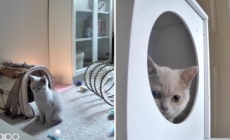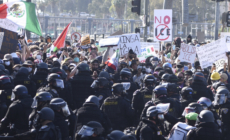-
Entertainment World Honors Sly Stone: Funk Legend Dead at 82 - 14 mins ago
-
Commentary: Why this overheated invasion of L.A. looks so ugly and feels so personal - 29 mins ago
-
Germaine Pratt’s Release Could Benefit Commanders - 49 mins ago
-
Israel Plans to Deport Gaza Aid Boat Passengers, Including Greta Thunberg - 51 mins ago
-
L.A. school police to set up safe zones around schools, graduations - about 1 hour ago
-
Cat Owner Checks Pet Cam While at Work—What She Sees Changes Everything - about 1 hour ago
-
This Is What Autocracy Looks Like - 2 hours ago
-
See Gizmo fly! Second Big Bear eaglet has flown the nest - 2 hours ago
-
75 Democrats Express ‘Gratitude’ to ICE in Antisemitism Vote Amid LA Riots - 2 hours ago
-
Defying Trump’s Firing, Smithsonian Says It Controls Personnel Decisions - 2 hours ago
Column: The California compromise — be prepared to evacuate
What do you pack?
Some clothes, of course. Toiletries. Medication. Computers, phones and chargers.
The dog.
I grabbed a suitcase Wednesday morning and tossed some clothes into it. My wife began gathering up some family photographs.
I stood and stared a bit, feeling somewhat paralyzed by uncertainty. You don’t know where you’ll go, how long you’ll be there, or what you might later return to.
The California compromise is ever-present. Along with the benefits — great weather, dramatic landscapes and a million things to do — you sign up for year-round risk.
Earthquakes, flooding, mudslides, drought.
Wildfire.

A firefighter runs down the street to check on a burning home as the wind fueled Eaton fire destroys homes on Tuesday in Altadena.
(Gina Ferazzi/Los Angeles Times)
I spent much of Tuesday reporting on a story unrelated to the Palisades fire, checking regularly for updates on the horrifying, fast-spreading blaze.
The scenes on television looked like the end of the world. Houses and hills ablaze, people abandoning homes and cars, walking down the hill toward the sea and hurrying along the Pacific Coast Highway.
A lifeguard stand caught fire.
It looked like we were going to be relatively lucky where we live, near the intersection of western Pasadena, Eagle Rock and Highland Park. Our daughter went to downtown L.A. with friends, all of them on winter break from college.
Late Tuesday afternoon, flames appeared in the near distance. From my front porch, I could see the beginning of the Eaton fire.
Our daughter contacted us to say she was returning home. One of the friends lives in Altadena and the family had gotten an evacuation order.
The flames spread, an orange wave crashing over the steep hills of Eaton Canyon.
Even then, the threat seemed distant.

A man wrapped in a quilt sits on the sidewalk as high winds whip burning embers from the Palisades fire just off Pacific Coast Highway on Tuesday in Santa Monica.
(Gina Ferazzi/Los Angeles Times)
Then we were awakened Wednesday morning by warning alarms on our phones from the L.A. County Office of Emergency Management:
“An evacuation warning has been issued in your area. Remain vigilant of any threats and be ready to evacuate. Gather loved ones, pets, and supplies.”
I looked out the window at the ugly, murky orange sky.
I took the dog out back and he seemed confused. The smoke was thick. I flicked fallen ash off of my head.
Our daughter checked with the friend who had been evacuated Tuesday night.
“Her house is gone,” my daughter said.
Another friend lost her home, too.
I couldn’t see any flames, in any direction, so the situation didn’t seem dire. But the sky was dark, and the smoke so thick, nearby flames might have been obscured.
I went out to the front yard and found a dry, flaky ember nearly the size of a dollar bill. That’s one of the threats, of course. That wind-driven embers help spread the destruction, sparking fires for miles around.
I filled a suitcase. Our beagle seemed to know that we were off our normal routines.
My wife thought of something we’d forgotten to pack.
Documents.
We grabbed passports and a few other items.
As of 9 a.m., we’d gotten no updates on a possible evacuation order.
It occurred to me that for all the ever-present risks in California, we live in a cocoon of denial, playing the odds and figuring we’re going to be okay.
But the order of things is different now in this age of accelerated climate change.
The heat is hotter. The winds are stronger. The droughts are longer. The fires are more deadly.
We live now not just with the risk of destruction, but with the possibility that this will be the way going forward — all the extremes becoming all the more normal.
On TV news, I saw an interview with a man standing outside his Altadena home. The house was destroyed by fire, along with his vehicles.
We still have our lives, he told the interviewer.
Everything else is secondary.
steve.lopez@latimes.com
Source link

















